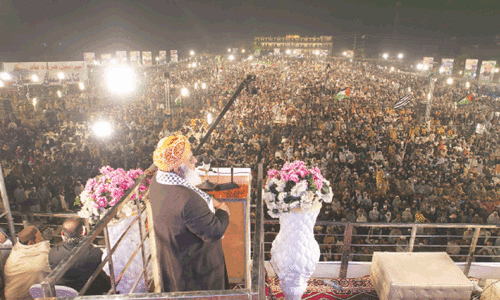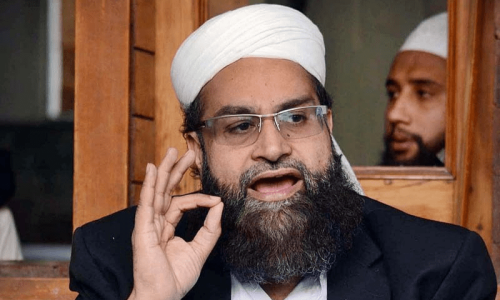• CII members, ministers term proposed legislation ‘flawed’; say seminaries need to remain under education ministry
• Fazl asks why president won’t sign bill passed by parliament; says plan of action to be announced after meeting Taqi Usmani on 17th
• Wafaqul Madaris Al Arabia chief decries politicisation of seminaries, assures Naqvi of support for govt stance
ISLAMABAD / CHARSADDA: Even as Maulana Fazlur Rehman continued to demand presidential assent for the recently-passed bill on seminary registration, the government on Monday — backed by members of the Council of Islamic Ideology (CII) — came out in opposition to the very piece of legislation it had passed, saying the draft had many flaws and should not be approved.
At the ‘Conference on Madressah Registration and Reforms’, held in support of the existing framework, ulema and government ministers contended that the current system of seminaries’ registration should not be changed, and urged the federal government to maintain the status quo and not accede to the demands of the JUI-F chief.
CII member Tahir Mahmood Ashrafi also presented a resolution at the conference, which was approved unanimously, demanding that the government of Pakistan maintain the current system of madressah registration.
The resolution called for consultation with the management of all madressah boards before any new legislation in this regard. It also called for retaining the Directorate General of Religious Education (DGRE) and keeping seminaries linked with the country’s education system.
Issue at hand
Under the Societies Act of 1860, religious seminaries were supposed to be registered by the relevant deputy commissioner’s office. Traditionally, there were five seminary boards — four belonging to the respective mainstream sects: Barelvi, Shia, Deobandi, and Ahle Hadith schools of thought, while the fifth board administered the affairs of seminaries under the control of the Jamaat-i-Islami.
However, after three years of consultations following the 2014 Army Public School Peshawar attack, these five boards agreed with the government that seminaries should be placed under the administrative control of the Federal Education Department.
Subsequently, the Directorate General of Religious Education (DGRE) was established and the government also decided to make rules allowing the establishment of more madressah boards. Since 2019, ten new boards have been established, which seemingly pose a challenge to the monopoly enjoyed by the five traditional seminary boards.
In October this year, the government had agreed to introduce the Societies Registration (Amendment) Act, 2024 as it attempted to woo the JUI-F chief for the sake of the 26th Amendment.
This piece of legislation, which would revert control of seminaries from the education department to the DCs, was approved by both houses of parliament. However, it was not signed by President Asif Ali Zardari, who returned the bill to the National Assembly in late October due to “several technical flaws”.
When the Maulana learnt of this development, he threatened to launch protests against the government to force it to accept the bill. But as the ruling allies closed ranks, even the opposition PTI refused to join the JUI-F’s proposed agitation, with Barrister Gohar Ali Khan saying that the 2019 decision to mainstream madressahs was made through “national consensus”.
Govt-sponsored conference
At Monday’s event, Education Minister Dr Khalid Maqbool Siddiqui said that the rollback of the 2019 agreement was not acceptable to his party, nor would it be in the interests of the country.
“Madressah reforms have been a serious issue in terms of national security as well, and at the same time, the boards of religious seminaries had demanded that madressahs be placed [under] the federal education department in 2019”.
He said that agreement was a need of the hour at the time, to save seminaries from international pressure in the wake of the Financial Action Task Force (FATF) regime, and terrorism-related allegations.
Allama Jawad Naqvi, who belongs to one of the new seminary boards, stressed that madressahs needed to stem four stigmas — involvement in politics and agitation, businesses, sectarianism, and terrorism. His suggestion was endorsed by the gathering.
On the other hand, Information Minister Atta Tarar said there were ‘legal complications’ in the proposed legislation and extensive consultations were being carried out to reach a solution that would be acceptable to all stakeholders, the Associated Press of Pakistan quoted him as saying.
The minister said that a few years back, a system was devised after extensive consultations to bring religious seminaries into the mainstream.
“Registration of 18,000 seminaries is the result of the efforts of the DGRE,” he said, appreciating its efforts. He said the suggestions given by the scholars had been noted, and a solution would be found after thorough consultations.
However, he refrained from attacking Maulana Fazlur Rehman, insisting that the JUI-F chief was “a respectable leader whose suggestions would be given due importance”.
Minister for Religious Affairs Chaudhary Salik Hussain, CII Chairman Dr Raghib Naeemi and others also addressed the conference.
In a related development, Interior Minister Mohsin Naqvi visited Jamia Ashrafia in Lahore and met Maulana Fazl Rahim Ashrafi, the patron-in-chief of Wifaqul Madaris Al Arabia, the board of seminaries belonging to the Deobandi school of thought.
According to APP, Maulana Fazal Rahim told the minister there should be no politics over seminaries, and expressed a desire to play a positive role on the issue.

Maulana sticks to his guns
Speaking to reporters at the residence of JUI-F leader Barrister Arshad Abdullah in Uthmanzai on Monday, the JUI-F chief questioned what was keeping President Asif Zardari from signing the seminaries law, when other bills were being signed into law.
He recalled that the idea in 2019 was to introduce a new system, but what eventually emerged was just an ‘agreement’.
The government is linking seminaries with an executive order, while we want to bring them within the ambit of the law, he said.
The Maulana also said that he did not want a clash with the state, but accused the government of trying to “divide ulema”.
He recalled that at the time of the passage of the 26th amendment, the president, the prime minister, all parties and institutions had agreed to the draft, which was eventually passed by parliament.
“Now, if the president can sign other constitutional bills, why he cannot sign the registration of religious madrassas? Madrassas are free to register with any institution. We will not compromise on the freedom and autonomy of madrassas,” he said.
He said that Mufti Taqi Usmani had convened a meeting of madressah boards on Dec 17 and a plan of action would be given there.
Published in Dawn, December 10th, 2024















































